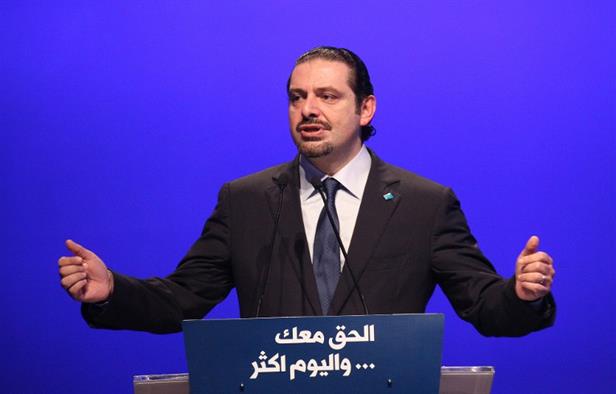The money monster
Michael Young/Now Lebanon/June 09/16
What do Hariri’s woes tell us about Saudi strategy?
Former Lebanese prime minister Saad Hariri delivers a speech during a gathering to mark the 11th anniversary of the assassination of his father and Lebanon
It’s routine for the daily Al-Akhbar to report on the difficulties of Saad Hariri. Indeed, the newspaper has a correspondent, Maysam Rizk, whose beat is to cover the former prime minister and the Future Movement, usually with a focus on their setbacks. Sometimes the stories are accurate, more often they have problems.
However, when it comes to information on Hariri’s financial woes, Rizk appears to have a large number of sources inside the Future Movement. Frequently these are disgruntled employees, meaning they are willing to pass on the bad news.
An article on Thursday in Al-Akhbar, this time by Amal Khalil, was in a similar vein. It reported that the guards in Hariri establishments have been told that they would be let off this month, after receiving their salaries and compensation. More dramatically, Khalil wrote, “The situation of [Saudi Oger, Hariri’s contracting company] suggests that it is bankrupt, though this has not been announced. According to sources inside the company, unpaid salaries in the last eight months total some $500 million, so how much would the payment of compensation to those let go, which is mandated by law, represent?”
The question is a good one, and regardless of Al-Akhbar’s real intentions, it is becoming increasingly difficult today for the Hariri camp to evade an answer. The financial situation in Hariri institutions is extremely serious, and the repercussions may have a bearing on much more than Hariri’s political fate.
Perhaps that’s where one must seek an answer to the question about why the interior minister, Nohad Machnouk, made surprising statements about Saudi Arabia in a talk show last week on LBCI. Machnouk said that Hariri’s support for the candidacy of Sleiman Franjieh had come after it was endorsed by the United Kingdom, the United States and Saudi Arabia. He also went on to point out that Hariri’s decision to visit Damascus in 2009 was done at the behest of the Saudis, something difficult to deny after King Abdullah accompanied Assad to Beirut in 2010.
Machnouk’s remarks, which prompted an irate Saudi reaction, were open to various interpretations. Some suggested the minister was acting on behalf of Hariri and that his statements were a way for the former prime minister to get out of his commitment to Franjieh. With Franjieh’s candidacy on the rocks today, and the Saudis having taken their distance from him, the argument went, Hariri would like to examine alternatives.
That could be partly true, though there are Hariri parliamentarians who strongly deny such an interpretation. Far from relaying a Hariri message, one that was deniable, they argue, Machnouk has started to drift off the reservation. It could be that the interior minister has political ambitions of his own, they point out, and seeks to do in Beirut what Ashraf Rifi did in Tripoli. Warnings from Walid Jumblatt that Hariri beware of those around him appear to lend credence to this view.
There are many interpretations, but all have meaning in the fact that Hariri is facing a major financial trial, with existential implications, which is undermining his political credibility. But would allowing his political demise really be in the Saudi interest? For now, at least, offering an answer does not appear to be a priority in the kingdom, as it struggles to regain control over its spending at a time when oil prices remain persistently low.
There was a time when Saudi officials understood better the stakes in Lebanon. The country was not only a place to buy influence, but also one where the contradictions of the region tended to be played out. Given the Saudis’ focus on containing Iran, it is surprising that the kingdom has given such modest attention to its allies in Lebanon—maybe because it feels the country has already fallen into the lap of Hezbollah.
But that does not answer the question of whether allowing Hariri to sink, regardless of whether his companies were mismanaged, is good politics. In a country where politicians serve as clients for regional powers, whatever the Saudis do will have a bearing on their credibility elsewhere. Perhaps they have written Hariri off, though that doesn’t seem to be the case. But appearing to do so while not really doing so only reflects ambiguity that will confuse Saudi friends and foes alike.
Michael Young is a writer and editor in Beirut. He tweets @BeirutCalling.




















